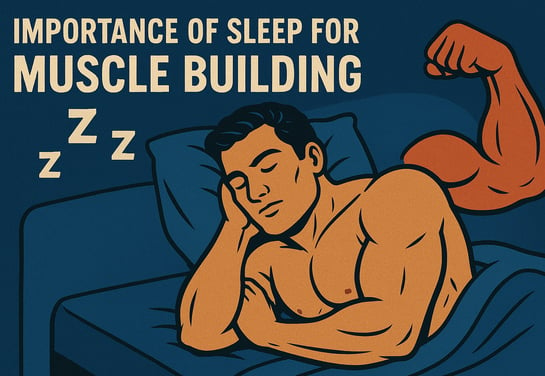The Crucial Role of Sleep in Muscle Building
One of the most significant factors contributing to effective muscle recovery is the role of sleep. During sleep, particularly in the deep sleep stages, vital processes occur that facilitate muscle repair and growth. Increased protein synthesis...
4/15/20255 min read


Understanding Muscle Recovery
Muscle recovery is a critical phase in the process of building strength and enhancing physical performance. When an individual engages in resistance training or high-intensity workouts, they create micro-tears in their muscle fibers. This damage is a normal occurrence and is essential for muscle growth, as it triggers the body's recovery processes. Recovery is not merely a passive event; it encompasses a series of complex physiological reactions aimed at repairing tissue, replenishing energy stores, and adapting to the stress imposed during exercise.
One of the most significant factors contributing to effective muscle recovery is the role of sleep. During sleep, particularly in the deep sleep stages, vital processes occur that facilitate muscle repair and growth. Increased protein synthesis, for example, is a hallmark of recovery that predominantly happens during this time. Protein synthesis is the process by which the body uses amino acids to repair and build muscle fibers, ensuring that they strengthen in response to the stress endured. This mechanism is fundamental for anyone looking to enhance muscle development.
Hormonal changes during sleep are also pivotal to muscle recovery. Sleep promotes the release of hormones such as growth hormone and testosterone, both of which are essential for muscle repair and regeneration. Growth hormone, produced predominantly during deep sleep, plays a significant role in stimulating tissue growth and repair, enhancing protein metabolism. Similarly, testosterone aids in protein synthesis and is fundamental for developing lean muscle mass. Therefore, prioritizing quality sleep is crucial for athletes and fitness enthusiasts aiming for optimal muscle recovery and growth. By understanding the science behind these physiological processes, individuals can better appreciate the indispensable link between sleep and muscle recovery.
The Connection Between Sleep and Muscle Growth
Sleep is a fundamental component of muscle building, often overlooked in discussions about exercise and nutrition. The relationship between sleep quality and muscle growth is deeply intertwined, as inadequate rest can significantly impair one's performance in the gym. When individuals do not receive sufficient sleep, their physical capacity is compromised. Research indicates that sleep deprivation can lead to increased fatigue, which diminishes overall workout efficiency and intensity.
Moreover, sleep plays a vital role in the recovery process post-exercise. During sleep, particularly in the deep sleep phases, the body releases growth hormone, which is crucial for muscle repair and regeneration. A study published in the journal Sleep found that athletes who reported better sleep quality experienced marked improvements in muscle growth markers, such as protein synthesis and muscle hypertrophy. In contrast, those suffering from poor sleep often exhibited decreased levels of these essential indicators, showcasing the direct impact of sleep on muscle development.
The recommended amount of sleep for optimal muscle building is generally between 7 to 9 hours per night. This timeframe allows for adequate recovery, hormone regulation, and energy replenishment, all important elements for muscle growth. Furthermore, sleep deprivation can lead to increased levels of cortisol, a stress hormone that can promote muscle breakdown, ultimately counteracting the hard work put in at the gym.
In summary, prioritizing quality sleep is essential for anyone invested in muscle building. A consistent sleep schedule not only enhances recovery but also boosts performance, allowing individuals to fully capitalize on their training efforts. Understanding the critical role that sleep plays in the muscle growth process can help to optimize physical conditioning and overall athletic performance.
Sleep Strategies for Optimal Muscle Building
To enhance muscle building effectively, prioritizing sleep quality is essential. Several actionable strategies can optimize sleep, ultimately supporting muscle repair and growth. One fundamental approach involves creating a sleep-conducive environment. Ensuring your bedroom is dark, quiet, and cool can significantly improve sleep quality. Use blackout curtains to block outside light and consider earplugs or a white noise machine to silence disruptive sounds. Additionally, a comfortable mattress and pillows that support your sleep position can facilitate deeper rest, which is crucial for recovery after intense workouts.
Another critical strategy for optimizing sleep in relation to muscle building is establishing a consistent bedtime routine. Going to bed and waking up at the same time each day helps regulate your body’s internal clock, promoting better sleep patterns. Before bedtime, engaging in calming activities such as reading or gentle stretching can signal your body that it is time to wind down. Limiting exposure to screens an hour before sleep, as the blue light emitted by devices can interfere with melatonin production, will also enhance the quality of your rest.
Stress management plays a significant role in promoting restorative sleep as well. High stress levels can lead to insomnia or disrupted sleep cycles, adversely affecting muscle recovery. Incorporating relaxation techniques, such as meditation or deep-breathing exercises, can be beneficial. Furthermore, nutrition should be carefully considered; consuming a balanced diet rich in antioxidants, vitamins, and minerals supports overall health and can promote better sleep. Foods such as bananas, almonds, and turkey contain sleep-promoting compounds, while some may find particular supplements, like melatonin or magnesium, helpful in improving sleep quality.
By implementing these strategies, individuals can cultivate a lifestyle conducive to optimal sleep, ultimately enhancing their muscle-building efforts. Regularly prioritizing these aspects leads to improved recovery, hormonal balance, and, consequently, muscle growth.
Common Sleep Disorders and Their Impact on Muscle Building
Sleep disorders are prevalent issues that can significantly hinder muscle building and overall physical performance. Among the most common disorders are insomnia, sleep apnea, and restless leg syndrome, each of which uniquely affects sleep quality and duration, critical components in the recovery process necessary for muscle growth.
Insomnia, characterized by difficulty falling or staying asleep, leads to fragmented sleep patterns. This disruption can hinder the body’s natural recovery processes and growth hormone production, both essential for muscle repair and hypertrophy. Chronic insomnia not only decreases sleep duration but also adversely affects hormonal balance, which can result in decreased muscle mass and strength over time. Individuals experiencing this disorder often report increased fatigue, making it challenging to maintain optimal workout routines, further compounding muscle-building challenges.
Sleep apnea, another common disorder, affects breathing during sleep, leading to temporary pauses that significantly disrupt sleep architecture. This condition can lead to chronic daytime fatigue and lower energy levels, which may affect workout intensity and focus. Research indicates that sleep apnea may also negatively impact insulin sensitivity, complicating muscle gain and fat loss. It is imperative for those who suspect they have sleep apnea to seek medical attention, as effective treatments can lead to significant improvements in both sleep quality and physical performance.
Restless leg syndrome, marked by uncomfortable sensations in the legs and an uncontrollable urge to move them, can prevent individuals from achieving uninterrupted nighttime rest. This disorder not only affects sleep quality but can lead to a vicious cycle of fatigue and decreased physical activity, further hindering efforts to build muscle.
Given the profound impact of these sleep disorders on muscle building, it is vital for individuals struggling with sleep issues to consult healthcare professionals. A tailored approach—including lifestyle changes, cognitive behavioral therapy, or medical treatments—can greatly mitigate the adverse effects of these conditions, supporting optimal recovery and performance in muscle-building endeavors.
